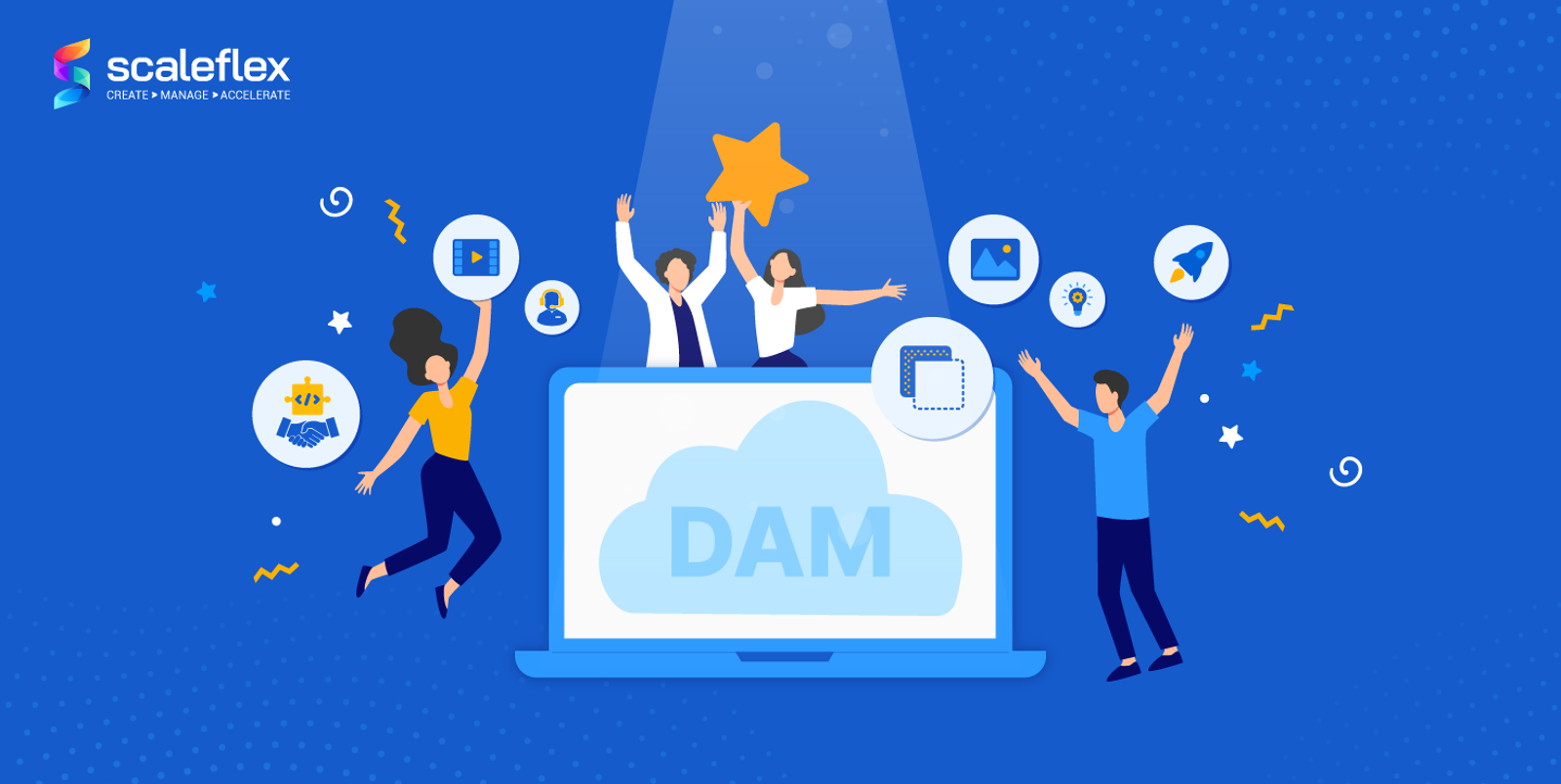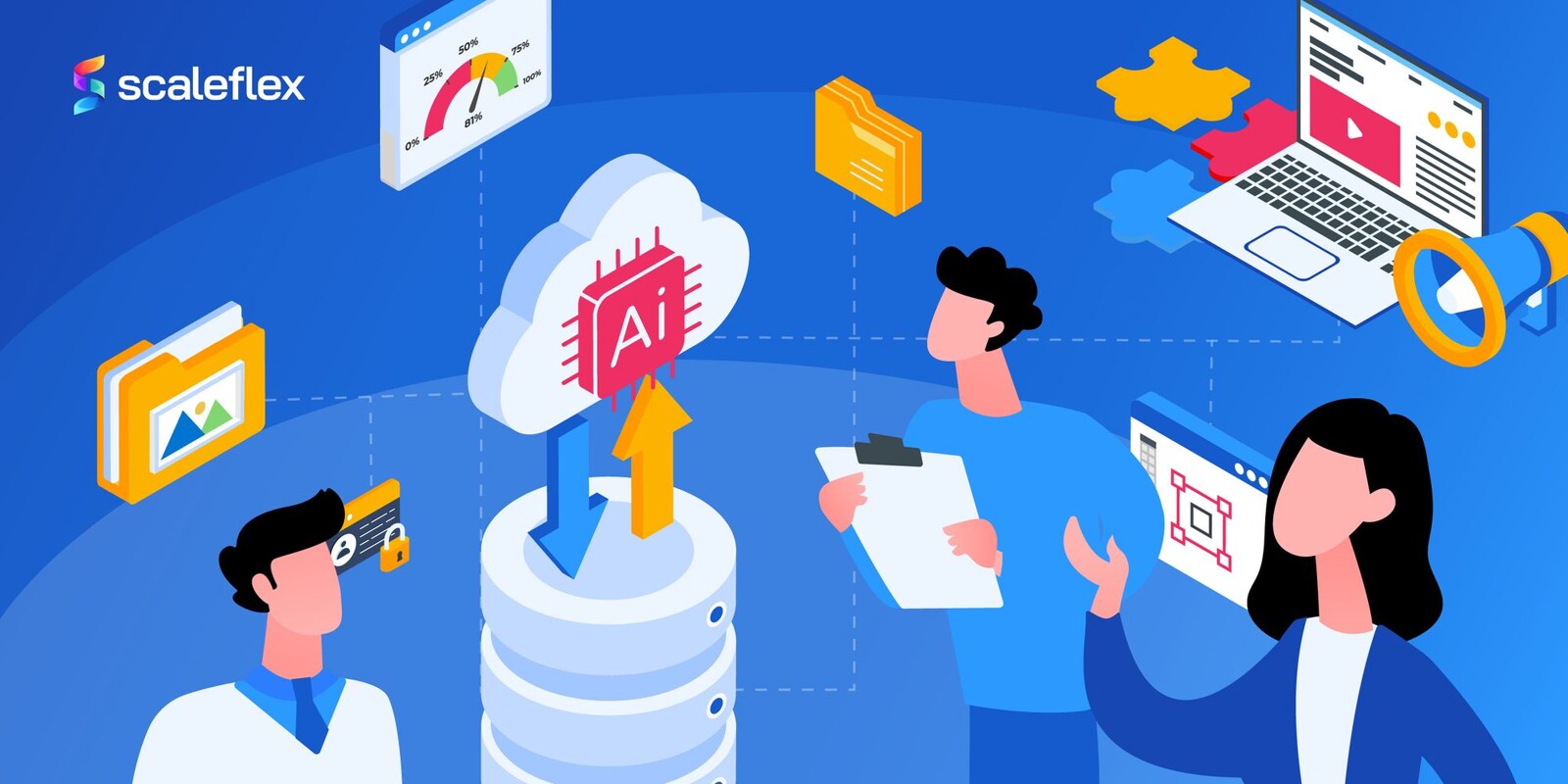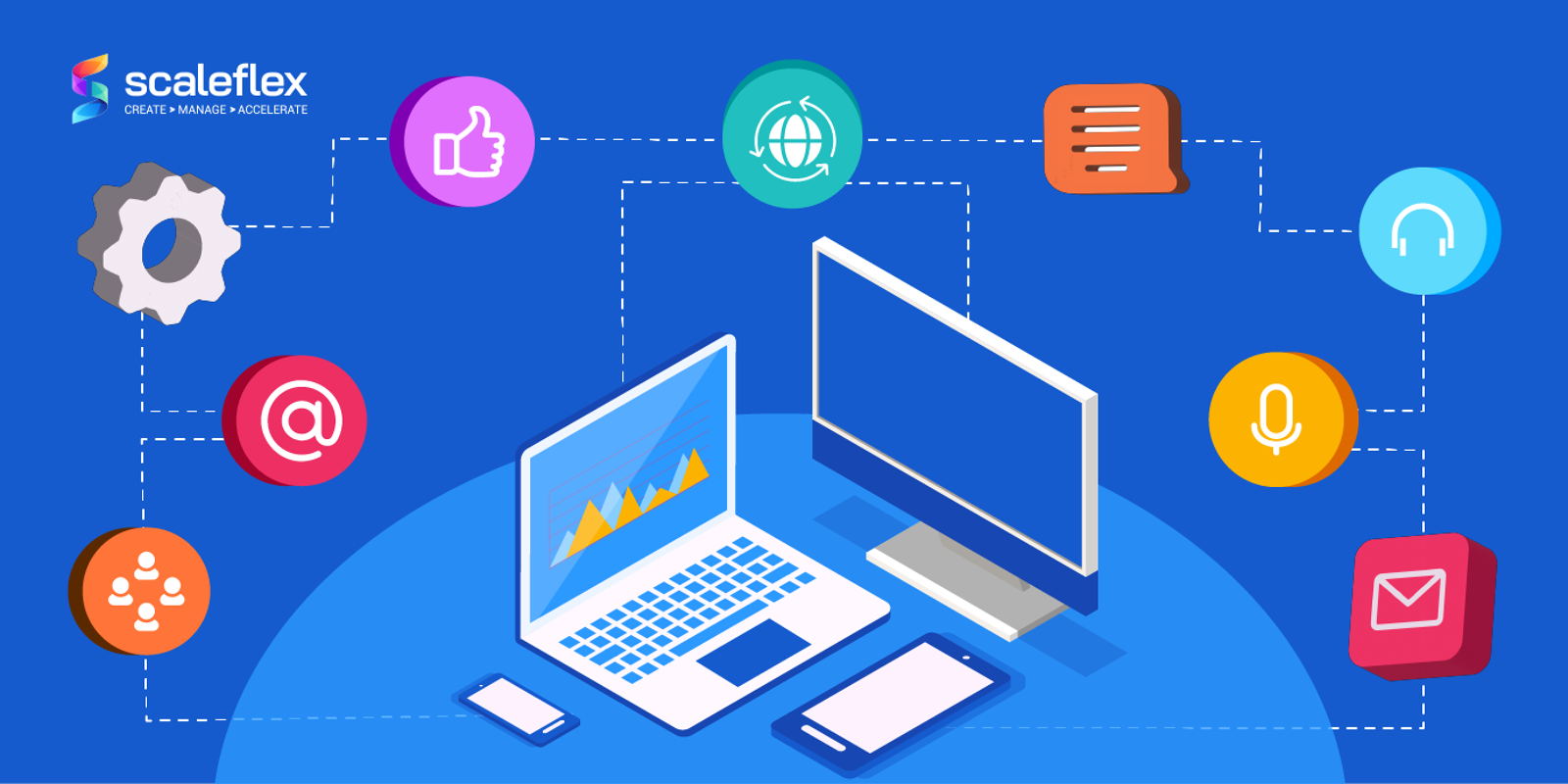What is AI as a Service (AIaaS): Benefits, Types and Main Challenges
In the ever-evolving world of technology, Artificial Intelligence (AI) has emerged as a transformative force, revolutionizing industries and reshaping the way we interact with the world around us. However, the complexities and costs associated with developing and implementing AI solutions have often limited its accessibility to businesses and organizations. This is where AIaaS (Artificial Intelligence as a Service) steps in, providing a game-changing approach to democratizing AI and making it accessible to a wider audience.
So, what is AI as a Service? AIaaS (Artificial Intelligence as a Service) refers to the delivery of AI capabilities over the cloud, much like Software as a Service (SaaS). It enables businesses to harness the power of AI without the burden of managing infrastructure, developing complex algorithms, or hiring specialized AI experts. This cloud-based approach breaks down the barriers to AI adoption, allowing businesses of all sizes to leverage AI for innovation, growth, and enhanced decision-making.
For this reason, businesses are increasingly turning to AIaaS to harness the power of AI without the complexities and costs of traditional AI implementation. As the demand for automation continues to surge, let's delve into what is AIaaS and how it can scale businesses.
Understanding AIaaS
AIaaS, or AI as a Service, is a cloud-based paradigm that provides businesses with access to AI capabilities without the need for in-house infrastructure, software development, or specialized expertise. It simplifies the process of adopting AI by offering pre-built AI tools, algorithms, and services that can be accessed and utilized through a web browser or API.
AIaaS stands as a distinct layer within the cloud computing paradigm, complementing the existing Infrastructure as a Service (IaaS), Platform as a Service (PaaS), and Software as a Service (SaaS) models. If you haven’t heard about these before, let me quickly explain what they are:
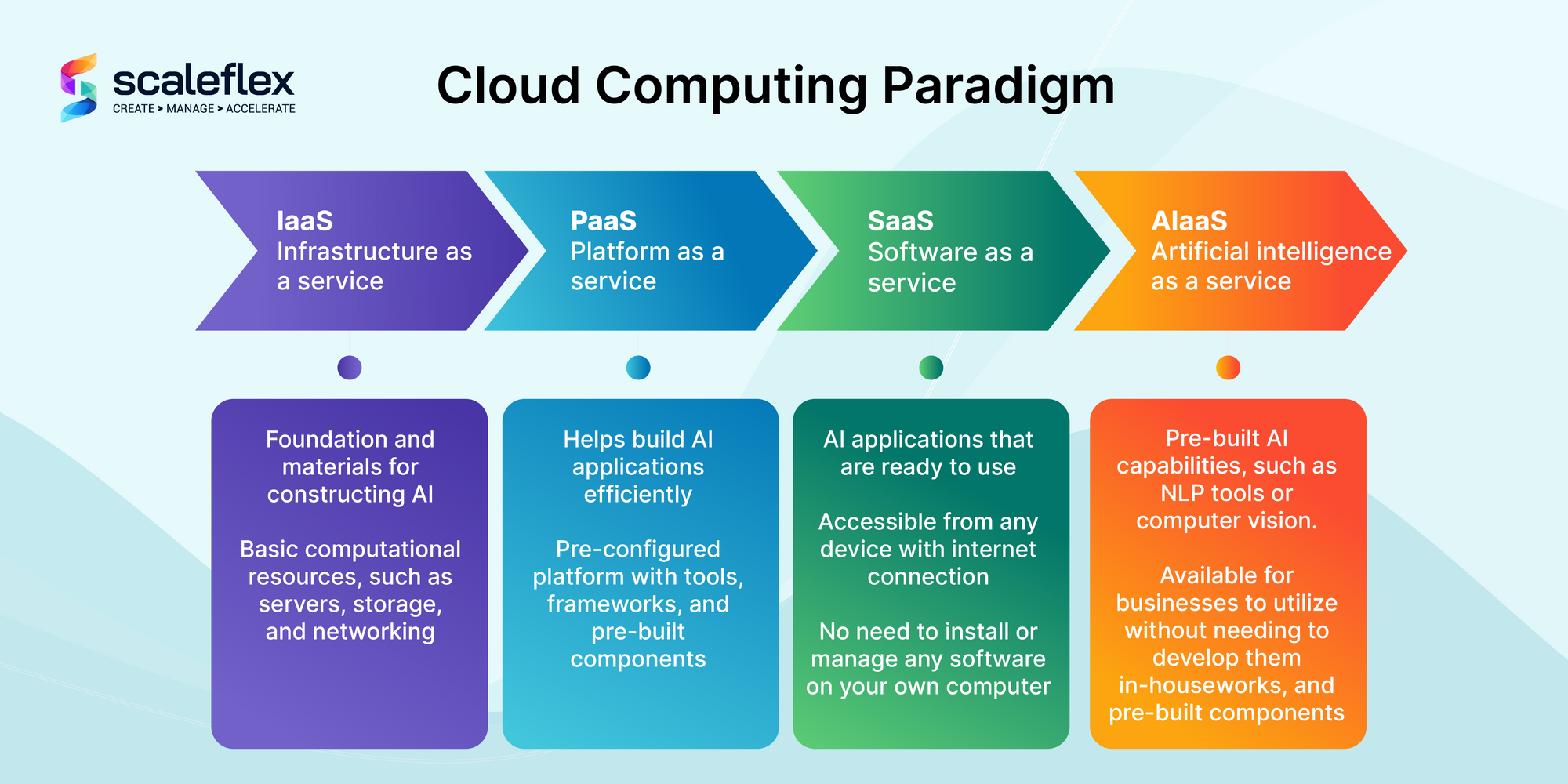
IaaS: The Building Blocks of AI
Imagine AI applications as buildings. IaaS provides the foundation and materials for constructing these AI buildings. It offers the basic computational resources, such as servers, storage, and networking, that AI applications need to run.
PaaS: The Scaffolding for AI
While IaaS provides the raw materials, PaaS acts as the scaffolding that helps you build AI applications efficiently. It offers a pre-configured platform with tools, frameworks, and pre-built components that streamline the process of developing and deploying AI models.
SaaS: Ready-Made AI Applications
In the world of AIaaS, SaaS takes the analogy a step further. It provides AI applications that are ready to use, like fully constructed houses that you can simply move into. Customers can access these applications from any device with an internet connection and don't need to install or manage any software on their own computers.
How is AIaaS different?
The key differentiator of AIaaS lies in its provision of pre-built AI capabilities, such as machine learning algorithms, natural language processing tools, and computer vision functionalities. These AI capabilities are readily available for businesses to utilize without needing to develop them in-house. This aspect distinguishes AIaaS from IaaS, PaaS, and SaaS, which primarily focus on infrastructure, platform, and software provisioning, respectively.
Return to the Table of ContentsTypes of AIaaS
AIaaS encompasses a wide range of AI capabilities and tools that can be applied to various use cases across industries. Here are some of the key types of AI as a Service and their common use cases:
- Visual AI: Visual AI utilizes computer vision technologies to analyze and extract insights from visual data, such as images and videos. This technology is used in various applications, including facial recognition, object detection, and image classification.
- Bots and Digital Assistants: AI-powered bots are transforming customer service, providing automated support, answering questions, and resolving issues. They are also used for marketing and sales, engaging with customers, providing product information, handling transactions, and even automating email responses.
- Machine Learning Frameworks: AIaaS offers pre-built machine learning frameworks that simplify the process of developing and deploying machine learning models. These frameworks provide tools, libraries, and algorithms for tasks like data preparation, model training, and evaluation.
- APIs: AIaaS APIs provide access to specific AI functionalities, such as natural language processing or speech recognition. Businesses can integrate these APIs into their applications to enhance their capabilities and add AI-powered features. Other APIs offer a diverse range of computer vision capabilities, which enable applications to delve into user-generated images and perform intricate tasks like facial recognition, object detection, and video search. This comes in handy in many industries. For instance, AI in real estate is being used to identify potential property damage or maintenance issues.
- Data Labeling: AIaaS data labeling services accelerate the development of machine learning models by providing high-quality labeled data. This data is essential for training machine learning algorithms to recognize patterns and make accurate predictions.
Now that we've covered its different types, let's explore the tangible AIaaS benefits that make them an increasingly attractive option for businesses of all sizes. So, what are the practical advantages that businesses can gain from leveraging AIaaS?
Return to the Table of ContentsBenefits of using AIaaS
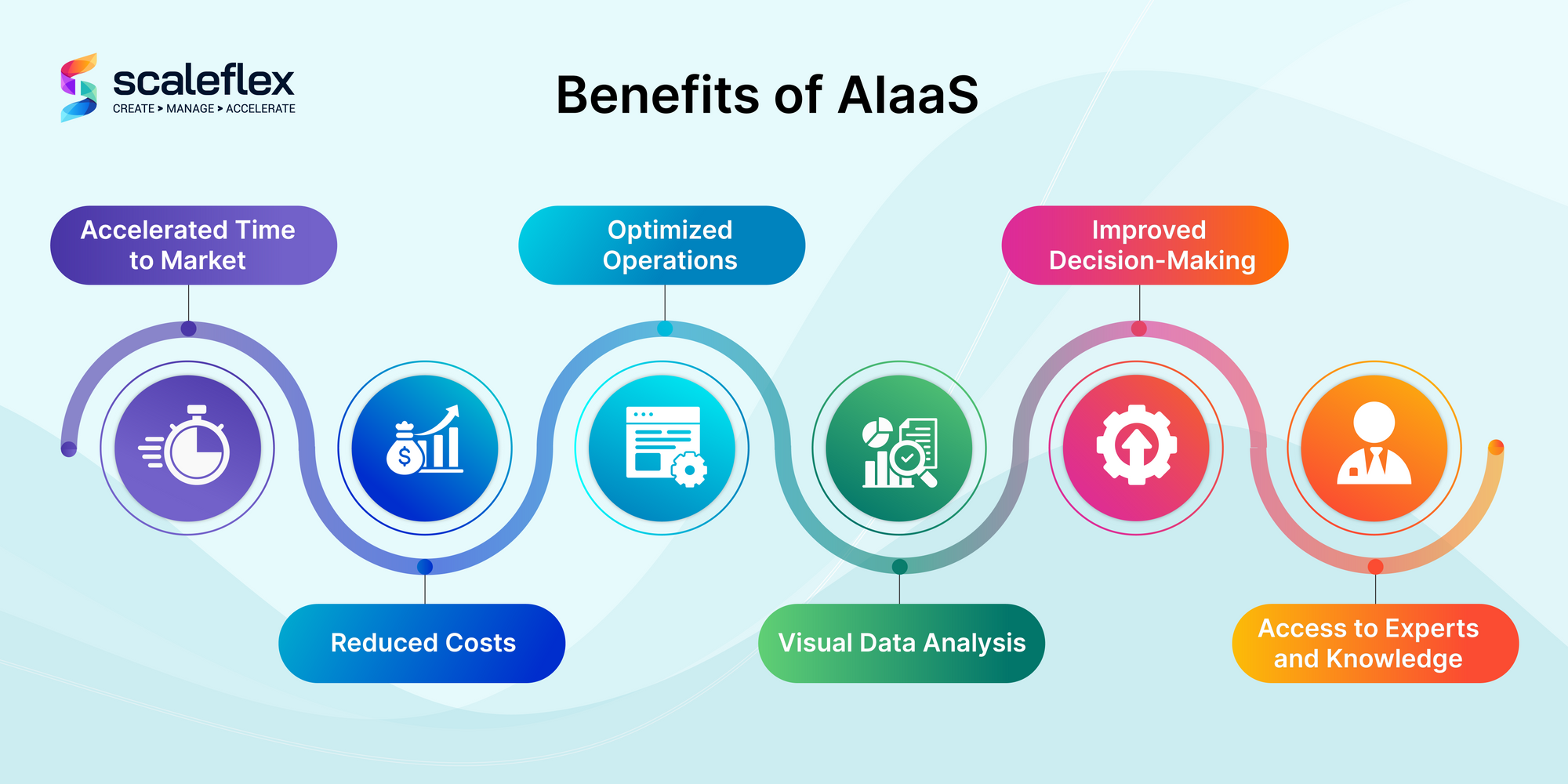
AIaaS doesn't just simplify development; it opens up a world of AI possibilities, letting businesses harness AI's power without the headaches. They offer a multitude of benefits to companies of all sizes, enabling them to accelerate innovation, enhance efficiency, and gain a competitive edge. Here are some of the key benefits:
- Accelerated Time to Market: AIaaS eliminates the need for upfront infrastructure investments and specialized AI expertise, significantly reducing the time required to develop and deploy AI applications. For instance, AI-powered chatbots can be rapidly deployed to provide 24/7 customer support, streamlining interactions and enhancing satisfaction.
- Reduced Costs: AI as a Service eliminates the need for businesses to invest in and maintain expensive on-premise infrastructure, significantly reducing the overall cost of AI adoption. This cost-efficiency is crucial for businesses of all sizes, particularly SMEs that may not have the resources to invest in in-house AI capabilities.
- Optimize operations: AIaaS enables businesses to rapidly experiment with new AI applications and functionalities, fostering innovation and adaptability and improving the existing processes. This agility is essential in today's dynamic business environment, where continuous innovation is crucial for success.
- Analyze visual data: Visual AI can analyze images and videos to identify objects, people, and actions, extracting valuable insights from visual data. Visual AI in eCommerce can be used to identify brands or change the background of the image.
- Improved Decision-Making: AI as a Service provides businesses with access to valuable insights and data-driven decision-making capabilities. AI algorithms can analyze vast amounts of data to identify patterns and trends, helping businesses make informed decisions.
- Access to Experts and Knowledge: AIaaS providers offer access to a team of AI experts who can guide businesses through the AI implementation process, troubleshoot issues, and optimize AI solutions. This support is especially helpful for businesses that lack in-house AI expertise. Like this, businesses can ensure that their AI solutions align with their business goals and seamlessly integrate with existing systems.
Challenges
AIaaS is a powerful tool with immense potential, but it's also a developing technology with its own set of challenges. Businesses need to carefully evaluate and manage these challenges to maximize the benefits of AI as a Service as it continues to evolve. Among the main challenges AIaaS is facing we can find the following:
- Data Privacy and Security: AIaaS solutions rely on access to sensitive data, and businesses must ensure that this data is securely stored and handled by the AIaaS provider. Data privacy regulations, such as GDPR, place strict requirements on data handling practices, and businesses must comply with these regulations to avoid legal and reputational risks.
- Transparency and Explainability: AI models can be complex and difficult to understand, raising concerns about fairness, accountability, and potential biases in AI algorithms. Businesses must carefully evaluate the transparency of AIaaS solutions to ensure that they align with their ethical standards and data governance policies.
- Vendor Dependence: AIaaS solutions are often proprietary, and businesses may become reliant on a single vendor for their AI needs. Businesses should consider factors such as open-source alternatives and portability of AI models before adopting AIaaS to minimize third-party dependence.
- Cost Considerations: While AIaaS initially reduces upfront costs, ongoing fees for usage and maintenance can be substantial. Businesses need to carefully evaluate their long-term cost expectations and ensure that AIaaS aligns with their budget and ROI goals.
Key takeaways
AI as a Service has revolutionized the way businesses leverage AI capabilities, offering a powerful and accessible platform for innovation. By eliminating the need for significant investment or in-house expertise, AIaaS has democratized the use of AI, enabling companies of all sizes to reap its benefits. As AIaaS continues to evolve, its transformative potential will only grow, paving the way for a future where businesses are empowered to make better decisions, automate processes, and gain a competitive edge. If you are looking for a vendor, then I advise you to take a look at this article about the Top 10 Computer Vision companies that will take center stage in 2024.
Return to the Table of Contents


